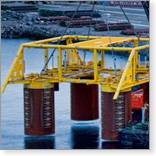Cost Blowouts on Norway's New Oil Developments
Several key oil and gas developments in Norway will cost much more than earlier expected and fields with approved development plans are now seen 10 percent more expensive than originally planned, the oil and energy ministry said on Wednesday.
Costs in Norway's offshore oil sector, already one of the most expensive in the world, have soared in recent years, weighing on the budget which provides generous tax breaks during the development phase.
The government has already said it would reduce tax breaks for new developments and the oil ministry launched an investigation into why costs soar.
Italian energy company Eni's Goliat field - Norway's first Arctic oil development - will cost 46.7 billion crowns ($7.21 billion), above the firm's 45 billion estimate in May and 49 percent more compared to the development plan approved in 2009.
Operator Eni has a stake of 65 percent in the field, while its partner Statoil (STO) holds the remaining 35 percent.
Lundin Petroleum, Brynhild, a relatively small development, will cost 6.9 billion crowns to develop, 1.9 billion crowns more than expected last year and its total price tag is now seen 58 percent above initial projections.
Lundin Petroleum controls 90 percent of the field, while Canadian company Talisman holds 10 percent.
BG's Knarr field is now estimated to cost 16.2 billion crowns, 4 billion crowns more than expected last year and 36 percent more than initially.
BG controls 45 percent of Knarr, together with Japan's Idemitsu which has 25 percent, Wintershall, a unit of Germany's BASF with 20 percent, and RWE Dea with 10 percent.
But Statoil's Polarled pipeline - Norway's biggest current pipeline investment - could cost 10 percent less than earlier projected, with the new price tag sees at 22.6 billion crowns, the ministry said.
Statoil's Aasgard development, the world's first subsea gas compression projects, however, will cost 8 percent more than originally projected.
(1 US dollar = 6.4748 Norwegian kroner)
(Reporting by Gwladys Fouche, writing by Balazs Koranyi; editing by Susan Thomas)















